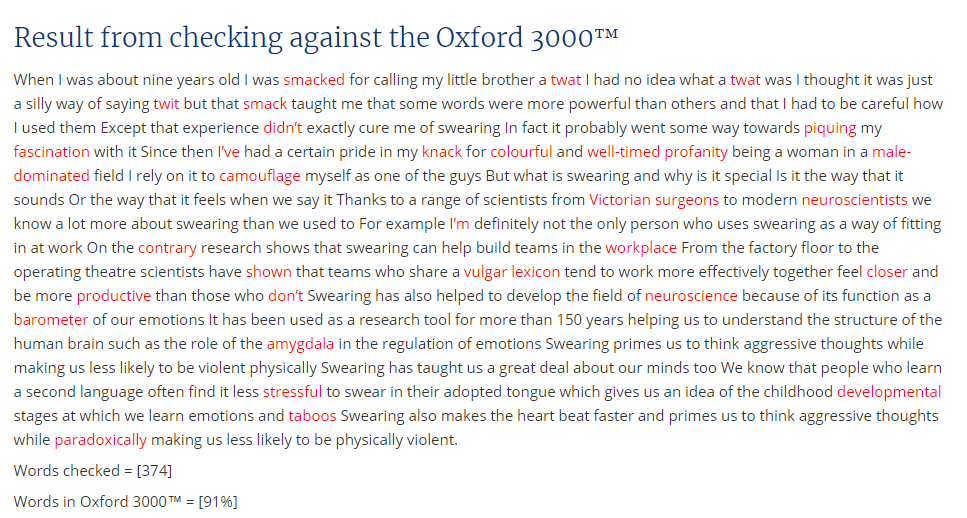How many English words do you need to learn to communicate and read articles? (spoiler: 3000)

Vocabulary is one of the main components on which a foreign language program is built. Grammar, listening, speaking - all these aspects use it one way or another. But there are a lot of words in the language (in English - more than a million). Which ones need to be learned and is it possible to optimize their memorization?
What's the matter?
Suppose you know three thousand words (great!). Most of them are related to your work, a rare hobby or dissertation. You know a lot of words, but you communicate with the speakers with a creak.
But your friend knows 1500 words, but cracks with foreigners right and left. What's the matter? Is he so smarter? ..
')
Everything is easier. Your friend has learned more common words: from everyday speech, colloquial phrases, stable expressions. It is easier for him to communicate and read texts on general topics, because his vocabulary is better suited for this. Not only the number of words learned, but also their quality matters.
What words to learn?
How to determine which words to learn first? This question was investigated in detail by the creators of the most authoritative dictionaries of the English language: Oxford, Macmillan and Longman. They agree that in order to successfully understand English, it is first of all desirable to learn the most frequent words - those that are more often found in speech and texts.

Thus, according to a study by the authors of the Macmillan dictionary, the 2500 most frequent words cover 80% of English. 7500 words cover already 90% of speech and allow you to conduct professional communication. The authors identified this by performing a computer analysis of thousands of texts of books, articles, essays and discussions (currently 1.6 billion words in the Macmillan corpus).
The authors of the Longman dictionary identified 3,000 (in reality a little more) words, according to a study , covering 86% of all texts in English.
The Oxford Dictionary also has its own list of the most important words of the English language. Here they are also 3000 (and here they are rounded down to even numbers), but the authors do not mention what percentage of speech and / or texts they will help to understand.
Other data also indicate a figure of 3,000 words, which should be enough to understand 95% of English.
So, the range of the most important words to learn is 2500-3500 words, which cover from 80% to 95% of English. This is a very important moment for learners of English, especially for beginners, because it is important to spend valuable time and energy on useful and necessary, and not to learn the word serendipity before losing your pulse, then to meet him once in the book of Robert Rankin.
Why does this work?
The list gives the student a clear goal: by learning these words, you will be able to understand most of the English language.
For example, you can get rid of the fragment of the article The Guardian in a special service of the Oxford dictionary , which shows how many words from the list Oxford 3000 are used in the text:

As you can see, 91% of the text falls on the 3000 most frequent words.
A similar service from Longman gives the figure of 81.9%:

These figures indicate that, knowing these 3,000 words, you will be able to read and understand the press in English. The same applies to books, magazines and any other non-specialized texts.
And then what?
If you have learned a list of the 3000 most frequent English words, there are two ways to expand vocabulary. You can follow them both in turn and in parallel.
1. Continue to learn the words, based on the criterion of frequency. This can help, for example, the Macmillan dictionary, which in addition to the 2500 most common words offers extended versions of a list of 5,000 and 7,500 words.
2. In-depth to learn words from the spheres you need. Select a topic of interest (cooking, engineering or breeding wombats) and try to learn all the terms.
According to statistics, which leads the compiler of the Macmillan English Dictionary, Michael Rundell, a native speaker knows an average of 40-45 thousand words. In other sources, there are fewer - 20-30 thousand (probably Michael Rundell still had in mind well-educated people with a large vocabulary). In any case, it is obvious that after 2500-3000 the most common words will grow further.
How does this work for Skyeng?




In our application, Words (helping to memorize words using interval repetitions ) has always been able to add both individual words and thematic sets. And now we have a list of frequency words. We called it Gold 3000, and already from mid-December, the words from it will receive special markings in our Skyeng app - golden bags:

This means that now students will be able to learn the most frequent words along with “their own” - those passed in the classroom or independently added to the study from the catalog or browser extension . So we want to keep the balance, which was mentioned above: the most frequent words + words needed by a particular student = maximum efficiency. Words from this list will now appear in daily workouts.
And in the cards of words from Gold 3000 there will be cool mnemonics: with pictures, gifs and short videos. For example, such:

With their help, learning common words will become more fun and easier, as mnemonics use associative memory.
We hope this innovation will help our students more accurately prioritize training.

Want to become our student - sign up for a free introductory lesson . And then do not forget to use the promo code HABRA when you first pay: these are two lessons as a gift .
Source: https://habr.com/ru/post/344186/
All Articles